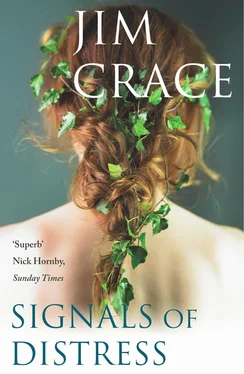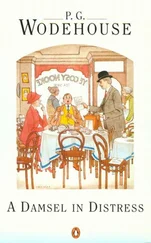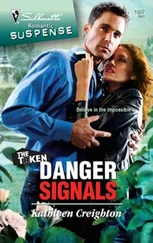‘Then it’s the work of Nature. Otto would not have the strength for that.’
‘He must’ve done. It’s him, all right. He signed his work. They say he’s put his name to it, scratched in some piece of benchwood that they found …’
Aymer walked out of the room and pulled his coat on as he ran along the inn’s odd levels to the parlour and the lane. No Ralph. No George. No Whip. He had to walk along the coast alone. He hadn’t known he had such energy or speed. His coastal walks had made him healthy. Now he could almost run. Six miles was not a trial.
Mrs Yapp had not exaggerated. The Cradle Rock had fallen on its side, and where the rock had once pivoted was now a newly opened cave, musty, colourless and wet, with streaks of bird lime and the bones of rats amongst the debris of the stone. When Aymer came, a group of fishermen were standing where the rock had been, talking in low voices with their hands across their mouths, as if they feared the wind would take their words away. Walter Howells was standing on the pivot edge, looking down on to the toppled Rock. He had his pistol in his jacket belt. ‘That’s never coming up again,’ he said. ‘That’s going to end up in the sea. A thousand shillings wouldn’t put that back in place. Don’t even ask.’
Skimmer and two of the Dollys climbed up from the headland rocks and joined their neighbours.
‘There in’t no sign of him,’ said Palmer’s father, Henry.
‘How long’s it been?’
‘Most half a day. He wasn’t there when we put up the nets. We sent the dogs out looking for the boy. And we’ve been hollering his name all morning.’
‘He’ll show up,’ said Skimmer.
‘Bound to.’
No one dared say ‘cannibal’. Palmer would show up all right, his bones picked clean, his blood drunk dry, his sable hair as lifeless as a mat. They blamed themselves. They’d had Otto almost in their hands. They should’ve tossed him in the sea. They should’ve kept him chained and gagged.
‘You’ll have to put a bullet through the bugger’s heart, Mr Howells,’ one fisherman said. ‘Or else what? If he can down a rock that size and on his own, then it’ll be our cottages next. He’ll snap our boats in two. He’ll rip the country up, so help me God.’
His neighbour stooped amongst the bones and lifted up a piece of broken glass. He put it to his nose. ‘That’s brandy I can smell,’ he said. ‘And fresh.’ The fishermen looked nervously inland. What now? They even turned to Aymer Smith for his advice, but he had none, or none at least that they would want to hear.
Aymer went down to the beach, past the thirty cattle from the Belle which were still fenced off by snaps of gorse amongst the dunes, awaiting agent Howells. The tide was high, almost on the turn, and heavy with weed. The kelp! He had forgotten it though it had brought him there. In that tumbling clarity of water, the weeds were as vibrant and seductive as a satin-merchant’s shop. The mustards and the crimsons he had seen when Ralph and the Bowes were fishing for their cow were no longer there. The seaweeds that he saw were darker, more mature, the sort of satins worn by spinsters, dowagers and chaperones, in mauves and browns and greys, the sort of satins favoured by the old.
IT WAS the third time that he’d knocked on Rosie Bowe’s front door. The dogs recognized him now. They didn’t bark. She let him in and put him in his usual place. There was an idling fire, and the smell of Sunday’s beef stew, saved for the dogs and greening in the pot. Aymer leant across and put three sovereigns on the shelf above the hearth. He didn’t want to justify the gift, or ornament it with a speech. He simply clicked each coin on the wood, so that she wouldn’t have to guess how much there was. He understood her independent mind, he thought. He was the independent sort himself. And he was keen to avoid her independent tongue, as well. He couldn’t forget her thrashing temper when he’d first offered her his help: the kelper’s shilling and the soap. ‘That in’t no use,’ she’d said, not guessing what a friend and benefactor he might be. ‘It’s a bad-luck shilling and we’ll have none of it.’ This time he wouldn’t preach at her, but carry out his duties without a word. His promise would be kept and his debt settled. She could pick the money up, or leave it there for ornament, or throw the bad-luck coins out. That responsibility was hers.
Rosie dished a plate of stew. The dogs could go without. No matter how upset she was and wanting privacy, she could hardly let her visitor shiver in his chair and not provide the victuals for his journey back. The beef did not taste good, but Aymer forced himself to chew on it, and eat the horn of home-bake and drink the lukewarm minted water that she gave him. It seemed important that he should finish everything. These were her modest thanks to him, he thought. He occupied himself with food. Where should he look, but at his spoon and plate?
She stared at him, expressionless. If he looked up from eating, her mouth and eyes grew narrow in the half darkness. Her face became invisible. Her teeth and eye-whites disappeared. She gave no sign of breathing. If she had lungs, they must have been in her legs. She was ill at ease with Aymer Smith, but not as ill at ease as he was, alone with her. Despite the comforts of the fire, the chair, the smell of food, he felt displaced, a vagrant, over-feathered bird on a starling’s nest. He was too big and cultured for that room. Nothing that he valued in himself had any value there. His modest wealth, his manners and his education — what did they count for? His charity? His Scepticism? His love of conversation and debate? His unexpected sympathy for dogs? His democratic spirit? His prodigious memory for Latin names? Which amongst these attributes should Rosie Bowe admire? Which of his parts and virtues could she burn for candle wax, and which would stew well with a turnip root? What use were manners for catching fish? Would Scepticism make a sauce? Would education batten down the roof against a lifting wind? Would love of dogs bring Miggy back? Aymer understood her narrowed eyes to mean, ‘You in’t no use to me!’
And he was right to some extent. For all his clumsy innocence, for all his clicking coins on the shelf, she didn’t value him. He was no use to her. He’d disappear like all the other passing gentlemen on their pedestrian expeditions through Dry Manston. Rosie had met a hundred men like Aymer Smith. They weren’t rare. Not in the summer anyway. They’d stop to sketch the cottage or ask the way. And then, what questions they would put! What was the folklore thereabouts? What were ‘conditions’ on the coast? What weather might be signified by easterlies? Which were the places where the seals came in? They’d make notes, persuade her to provide a plate of ‘whatever’s cooking on the fire’, look Miggy up and down as if she were a horse, donate a penny, then make their farewells — their plates not empty and their eyes not looking into hers, yet claiming that their lives had been enhanced by this encounter and exchange.
But Rosie’s life hadn’t been changed. She wasn’t enhanced by meeting gentlemen, and feeding them. No matter how they loved the ‘emancipations’ of sea and air, they didn’t stay for long enough to make their mark on her. They soon grew tired of pauper food, and Rosie’s conversation. They’d come for landscape, beauty, history. They didn’t want to taste her life. They disappeared without a trace. Like Aymer would. Except that he’d not grown tired as quickly as he might. He had at least stayed long enough to taste her life. And, by the looks of it, he would leave an empty plate.
Rosie watched him forcing down the stew, and tearing off small bites of home-bake as if he expected it to bite him back. He wasn’t used to wooden spoons, or eating off his lap, or chewing outskirt cuts of beef, or sitting on uncushioned wood with nothing overhead but a thatch of turf. She ought, she knew, to take the plate away. But let him eat like dogs before he goes, she thought. Let him get the tough and joyless taste of it. Let him gag.
Читать дальше












